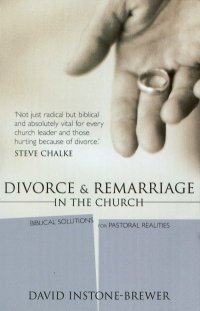

|
Reviews
Divorce and Remarriage | ||

|
John Goldingay Theology (UK) July/August 2003 |

|
| Full review: | ||
|
David Instone-Brewer, a Baptist minister who is now a research fellow at Tyndale House, Cambridge, here seeks to formulate an attitude to divorce and remarriage that finds a way between the libertarianism of no-fault divorce and the rigorism that (e.g.) recog-nizes divorce only on the grounds of adultery. As his subtitle suggests, he believes that understanding the impli-cations of the Scriptures' statements about divorce and remarriage requires us to look more carefully at their social and literary context, and his work is widely researched in that background. But every chapter begins with a synopsis of where it is going, and ends with a longer set of conclusions that emerge from the chapter. The result is that a book that could have been impossibly complex and thoroughly confusing is actually marvellously easy to find one's way through. It is also full of fascinating information, for instance about Jewish marriage practice. There are quotations from rabbinic regulations about how long men could abstain from sexual relations, regula-tions apparently inspired by complaints from the wives (the answer is, it depends on your job, but studying Torah was a better excuse than most). Boys and girls were married off by the time of puberty to safeguard against immorality; God is disturbed if someone is not married by the age of twenty. A second marriage was often treated as a relatively unimportant event and the breakup of a first marriage was more momentous than subsequent breakups. In Jewish marriage contracts, both bride and groom promised to feed, clothe and love each other. 'It is surprising how many Christian leaders have had poor marriages' (the [Baptist] Careys, the Wesleys, the Booths ..) -why is it surprising? And while attitudes in the first-century Jewish world were rather like those in the Western world two centuries ago, today's social context, in which marriage is popular, infidelity prevalent, and divorce easy, is rather similar to that of the Graeco-Roman back-ground to the New Testament. Against that background, Dr Instone-Brewer suggests, it is significant that Jesus and Paul oppose no-fault divorce. On the other hand, the Scriptures allow divorce on the grounds not only of unfaithfulness but also of neglect and abuse, and allow remarriage after divorce on such grounds. But they do not actually require someone to divorce their spouse in such circum-stances, and rather encourage forgiveness on the part of the victims of unfaithfulness, neglect and abuse. The implication is that while the Church has to live with and work with no-fault divorce in the secular world, its stance for its own life should be different. I have only one criticism, which is that pastoral advice in the book's closing pages seems a bit jejune after the sophistication of the main part of the book. Perhaps the author or the publisher thought it neces-sary to say something of a practical kind, but the main part of the book undermines the down-to-earth advice by showing us how deeply our context affects the way we live with the issues the book discusses. John Goldingay, Fuller Theological Seminary, Pasadena, California
|
||
| Read more reviews... | ||
Version
-for ministers
-for academics
-for everyone
Summary
Questions/
Comments
& Replies